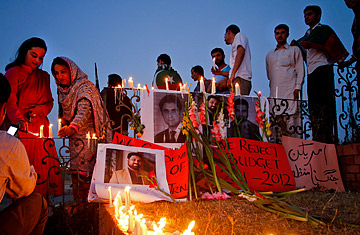
Supporters of Pakistan's Tehreek-e-Insaf (Movement of Justice) place candles next to portraits of slain journalist Syed Saleem Shahzad during a vigil in Islamabad, Pakistan, on Monday, June 6, 2011
(2 of 2)
The ISI denies that it ever threatened Shahzad or was involved in the kidnapping or killing of the journalist. The ISI has contacted Sethi, Haider and other journalists whom it feels have unfairly represented the spy agency.
"For what I've been saying since the bin Laden raid, I have incurred the wrath of the ISI," says Sethi. "The agency has officially expressed its anger and annoyance and irritation." A third journalist, Hamid Mir, a political-talk-show host, goes further. The ISI, Mir alleges, recently approached him to ask that he cease his endorsement of the current civilian government. "I have refused to extend my support to the armed forces' interference in politics," he says. "That's why they're against me."
For their comments about the military establishment, the three journalists could soon find themselves appearing before the Supreme Court. Sardar Muhammad Ghazi, a lawyer who served as deputy attorney general under the military regime of General Pervez Musharraf, has filed a 20-page petition calling on the court to stop them from disparaging the army and the ISI and to declare that such criticisms will not be tolerated and should lead to the shutdown of the offending television channel and newspaper. "These people are criticizing my armed forces," Ghazi says indignantly. "They sit and castigate the army. I can't tolerate it. There should be somebody who should come forward and say the media should be controlled." In the petition, he accuses Sethi, Haider and Mir of being "out to promote the foreign agenda to destabilize and denuclearize Pakistan." He alleges that the journalists are intent on allowing India to "expand [its] boundaries" and are influenced by the American, Indian and Israeli intelligence agencies.
Ghazi insists he did not submit the court petition at anyone's request. "It's purely in my individual capacity as a lawyer," he says. Haider and Mir suspect otherwise. "My sense now is that, given this petition, they have taken a decision to put some kind of pressure," Haider says, referring to the ISI. It is unclear whether Ghazi's petition will make it to court. While some lawyers doubt the prospect, the petitioner says his case is in line to be heard.
But Ghazi's petition may be merely one avenue of pressure. On the Web, the journalists are denounced as "traitors" and "fifth columnists." One pro-army website superimposed a blue Star of David on Haider's forehead in an attempt to cast him as an agent of Israeli intelligence. A widely circulated text message attacks Sethi and members of his family, insinuating that they are in the pay of the U.S. The journalists have little doubt as to the provenance of the electronic abuse. "This is now coming from the ISI's cybertrolls and ghost warriors," says Haider.
Sethi says he has received similar labels throughout his career. "When I was at college, we used to be called KGB agents," he says, recalling his days as a leftist student activist. "When I've favored peaceful relations [with India], I've been called a RAW agent," he adds, referring to New Delhi's external intelligence agency. And for advocating good relations with the U.S. and supporting the fight against Islamist militancy, he's been called a CIA agent.
The three journalists have also been discreetly banned from state-run media. When a prominent presenter at Pakistan Television (PTV) — the state-owned channel, which continues to enjoy a monopoly in rural areas where there is no cable penetration — tried to interview Haider for his analysis, the host of the show was told that the journalist was not allowed to appear on the air. The PTV presenter says Sethi and Mir are also banned.
"The past two months have been rough," says Sethi with a sigh. "It's been one thing after the next." In April, Sethi's security detail was increased after he was informed of a fresh but unexplained terrorist threat against him and his family. "According to a credible intelligence report," read a fax from the Interior Ministry to top police and intelligence officials, "terrorists are likely to attack Najam Sethi and his family." And despite the pressure, the veteran reporter can sound phlegmatic about it all, accepting it as a burden he's prepared to bear. "When you challenge corruption or military arbitrariness or extremism, and you don't stop doing it, you pay the price," he says.
